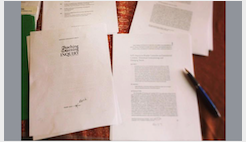Great Introspections: How and Why SoTL Looks Inward
DOI:
https://doi.org/10.20343/teachlearninqu.10.18Keywords:
introspection, reflection, scholarship of teaching and learningAbstract
Over its 10-year history, many pages of Teaching & Learning Inquiry have been devoted to explorations that feature introspection. At this moment as the journal’s founding co-editors, we look at how introspection manifests itself in many ways in the scholarship of teaching and learning (SoTL). We propose a taxonomy to help us appreciate some of the forms introspection might take and explore some of the benefits and challenges inherent in committing to introspection as a value. Ultimately, we argue that introspection is a pillar of SoTL.
References
Cambridge, Barbara. 2013. “Validity through Dialogue.” Teaching & Learning Inquiry 1 (1):19–21. https://doi.org/10.20343/teachlearninqu.1.1.19.
Cantrill, Stuart. 2009. “Revealing the Ribosome.” Nature Chemistry (October): 1. https://doi.org/10.1038/nchem.438.
Chick, Nancy L., Sophia Abbot, Lucy Mercer-Mapstone, Christopher P. Ostrowdun, and Krista Grensavitch. 2021. “Naming Is Power: Citation Practices in SoTL.” Teaching & Learning Inquiry 9 (2). https://doi.org/10.20343/teachlearninqu.9.2.2.
Chick, Nancy, and Gary Poole. 2013. “Launching TLI: SoTL’s Purposes, Processes, and People.” Teaching & Learning Inquiry 1 (1): 1–4. https://doi.org/10.20343/teachlearninqu.1.1.1.
Chick, Nancy, and Gary Poole. 2014. “The Necessary and Dual Conversations in a Vibrant SoTL.” Teaching & Learning Inquiry 2 (1):1–2. https://doi.org/10.20343/teachlearninqu.2.1.1.
Chng, Huang Hoon and Peter Looker. 2013. “On the Margins of SoTL Discourse: An Asian Perspective.” Teaching & Learning Inquiry 1 (1):131–45. https://doi.org/10.20343/teachlearninqu.1.1.131.
Clegg, Sue. 2000. “Knowing through Reflective Practice in Higher Education.” Educational Action Research 8 (3): 451–69. https://doi.org/10.1080/09650790000200128.
Cook-Sather, Alison, Sophia Abbot, and Peter Felten. 2019. “Legitimating Reflective Writing in SoTL: ‘Dysfunctional Illusions of Rigor’ Revisited.” Teaching & Learning Inquiry 7 (2): 14–27. https://doi.org/10.20343/teachlearninqu.7.2.2.
Corrigan, Paul T. 2019. “Threshold Concepts in Literary Studies.” Teaching & Learning Inquiry 7 (1): 3–17. https://doi.org/10.20343/teachlearninqu.7.1.2.
Cruz, Laura, and Eileen Grodziak. 2021. “SoTL under Stress: Rethinking Teaching and Learning Scholarship During a Global Pandemic.” Teaching & Learning Inquiry 9 (1): 3–12. https://doi.org/10.20343/teachlearninqu.9.1.2.
Day, Terence. 2015. “Academic Continuity: Staying True to Teaching Values and Objectives in the Face of Course Interruptions.” Teaching & Learning Inquiry 3 (1): 75–89. https://doi.org/10.20343/teachlearninqu.3.1.75.
Fanghanel, Joëlle. 2013. “Going Public with Pedagogical Inquiries: SoTL as a Methodology for Faculty Professional Development.” Teaching & Learning Inquiry 1 (1): 59–70. https://doi.org/10.20343/teachlearninqu.1.1.59.
Felten, Peter. 2013. “Principles of Good Practice in SoTL.” Teaching & Learning Inquiry 1 (1): 121–25. https://doi.org/10.20343/teachlearninqu.1.1.121.
Glisson, Lane, Shane McConnell, Mahatapa Palit, Jason Schneiderman, Cynthia Wiseman, and Lyle Yorks. 2014. “Looking in the Mirror of Inquiry: Knowledge in Our Students and in Ourselves.” Teaching & Learning Inquiry 2 (1): 7–20. https://doi.org/10.20343/teachlearninqu.2.1.7.
Hassel, Holly, and Christie Launius. 2017. “Crossing the Threshold in Introductory Women’s and Gender Studies Courses: An Assessment of Student Learning.” Teaching & Learning Inquiry 5 (2): 30–46. https://doi.org/10.20343/teachlearninqu.5.2.4.
Huber, Mary Taylor. 2004. Balancing Acts: The Scholarship of Teaching and Learning in Academic Careers. Washington, DC: American Association for Higher Education.
Hutchings, Pat. 2000. Opening Lines: Approaches to the Scholarship of Teaching and Learning. Menlo Park, CA: Carnegie Foundation for the Advancement of Teaching.
Hutchings, Pat, and Lee S. Shulman. 1999. “The Scholarship of Teaching: New Elaborations, New Developments.” Change: The Magazine of Higher Learning 31 (5): 1–15.
Kreber, Carolin. 2013. “The Transformative Potential of the Scholarship of Teaching.” Teaching & Learning Inquiry 1 (1): 5–18. https://doi.org/10.20343/teachlearninqu.1.1.5.
LaBoskey, Vicki Kubler. 2004. “The Methodology of Self-Study and Its Theoretical Underpinnings.” In International Handbook of Self-Study of Teaching and Teacher Education Practice, edited by J. John Loughran, Mary Lynn Hamilton, Vicki Kubler LaBoskey, and Tom Russell. 817–69. Springer.
Marton, Ference, and Roger Säljo. 1984. “Approaches to Learning.” In The Experience of Learning, edited by Ference Marton, Dai Hounsell, and Noel Entwistle. Edinburgh: Scottish Academic Press.
Medley-Rath, Stephanie. 2019. “Faking Sociology? A Content Analysis of an Introductory Sociology Student Photography Assignment.” Teaching & Learning Inquiry 7 (1): 18–33. https://doi.org/10.20343/teachlearninqu.7.1.3.
Meyer, Jan H.F., and Ray Land. 2005. “Threshold Concepts and Troublesome Knowledge (2): Epistemological Considerations and a Conceptual Framework for Teaching and Learning.” Higher Education 49: 373–88. https://doi.org/10.1007/s10734-004-6779-5.
Miller, Nod. 1994. “Participatory Action Research: Principles, Politics, and Possibilities.” New Directions for Adult and Continuing Education 63: 69–80.
Miller-Young, Janice, and Michelle Yeo. 2015. “Conceptualizing and Communicating SoTL: A Framework for the Field.” Teaching & Learning Inquiry 3 (2): 37–53. https://doi.org/10.20343/teachlearninqu.3.2.37.
Pace David. 2004. “The Amateur in the Operating Room: History and the Scholarship of Teaching and Learning.” The American Historical Review 109 (4): 1171–92. https://doi.org/10.1086/ahr/109.4.1171.
Poole, Gary, Lydia Jones, and Michael Whitfield. 2013. “Helping Students Reflect: Lessons from Cognitive Psychology.” Advances in Health Sciences Education 18 (4): 817–24. https://doi.org/10.1007/s10459-012-9373-0.
Ross, Lee, David Greene, Pamela House. 1977. “The ‘False Consensus Effect’: An Egocentric Bias in Social Perception and Attribution Processes.” Journal of Experimental Social Psychology 13 (3): 279–301. https://doi.org/10.1016/0022-1031(77)90049-X.
Schön, Donald A. 1987. Educating the Reflective Practitioner: Toward a New Design for Teaching and Learning in the Professions. Jossey-Bass.
Simmons, Nicola, Earle Abrahamson, Jessica M. Deshler, Barbara Kensington-Miller, Karen Manarin, Sue Morón-García, Carolyn Oliver, and Joanna Renc-Roe. 2013. “Conflicts and Configurations in a Liminal Space: SoTL Scholars’ Identity Development.” Teaching & Learning Inquiry 1 (2): 9–21. https://doi.org/10.20343/teachlearninqu.1.2.9.
Suls, Jerry. 2007. “False Uniqueness Bias.” In Encyclopedia of Social Psychology, edited by Roy F. Baumeister and Kathleen D. Vohs, 1: 345. Thousand Oaks, CA: SAGE Publications, Inc. https://dx.doi.org/10.4135/9781412956253.n213.
Sword, Helen. 2019. “The First Person.” Teaching & Learning Inquiry 7 (1): 182–90. https://doi.org/10.20343/teachlearninqu.7.1.12.
Werder, Carmen, Rebecca Pope-Ruark, Roselynn Verwoord. 2016. “Students as Co-inquirers (special section guest editors’ introduction). Teaching & Learning Inquiry 4 (2): 5–7.
Wismath, Shelly, Doug Orr, and Bruce MacKay. 2015. “Threshold Concepts in the Development of Problem-Solving Skills.” Teaching & Learning Inquiry 3 (1): 63–73. https://doi.org/10.20343/teachlearninqu.3.1.63.

Downloads
Published
Issue
Section
License
Copyright (c) 2022 Gary Poole, Nancy Chick

This work is licensed under a Creative Commons Attribution-NonCommercial 4.0 International License.






